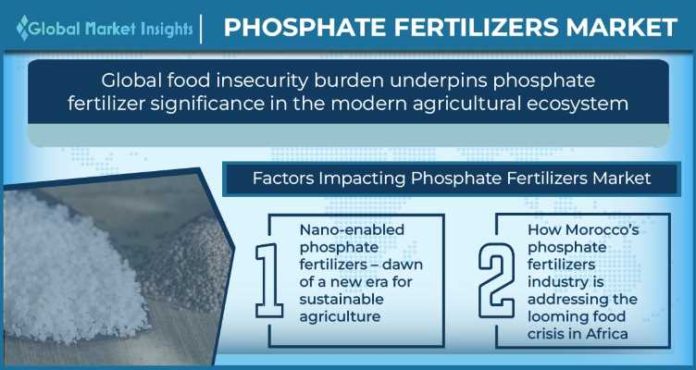Shift toward sustainable agricultural practices amid efforts to mitigate the burden of world hunger will trigger innovation in the phosphate fertilizers market.
Agriculture has long been a backbone of the global economy, playing a key role in ensuring food security in developing and developed nations worldwide. Despite being considered a critical factor in achieving the second SDG (Sustainable Development Goal) of zero hunger by 2030 set by the UN, the agriculture system is, at present, facing numerous challenges, many of them arising due to the rapid surge in the world population and the subsequent change in food demand. According to UN estimates, the global population could reach nearly 11 billion by 2100.
The healthy growth of crops and plants is dependent mainly on water and 13 key ingredients, including the Big 3 essential macronutrients, known as NPK or nitrogen, phosphorous, and potassium. Phosphorous, especially, is critical to plant development, contributing to energy transport in cells, root development, better resistance, and other benefits. Although important, phosphorous is difficult for plants to absorb naturally, an observation that has proved beneficial for the growth of phosphate fertilizers market in recent years.
Nano-enabled phosphate fertilizers – dawn of a new era for sustainable agriculture
For many farmers, using synthetic P fertilizers is a common practice to promote higher crop production and soil productivity. However, over the years, it has become increasingly apparent that overuse of these fertilizers is detrimental to agricultural practice in many ways. One of these is the nutrient losses that are caused due to the high dissolution of these fertilizers, which leads to environmental pollution, low crop productivity, financial losses, and depletion of natural top soil fertility. In this scenario, it has become the need of the hour to develop more environmentally sound methods of nutrient delivery with optimized fertilizer and resource usage, a need that is being fulfilled by the emergence of sustainable and smarter nano-enabled fertilizers.
Nanotechnology isthus gaining increasing acceptance in the agricultural sector, due to its ability to improve crop yields and create a healthier agro-ecosystem with minimal environmental adversities. This may eventually pave the way for nano-enabled phosphate fertilizers to become a major sustainability tool in future agriculture.
How Morocco’s phosphate fertilizers market is addressing the looming food crisis in Africa
Global food systems have been facing several challenges over the past few years, first due to the novel coronavirus outbreak in early 2020 and more recently, the ongoing conflict between Russia and Ukraine, which have triggered massive supply chain disruptions.
The impacts of these disruptions are being felt worldwide, but even more prominently in low-income regions like Africa, where malnutrition, severe hunger, and even death are becoming alarmingly evident. The rapid price rise in the phosphate fertilizers market is threatening to limit the agricultural input in the continent, which is already gearing up to face a nearly two-million-ton supply gap, as per predictions from an AfDB report.
Skyrocketing fertilizer prices and climate change are also challenging the authority of regions like Morocco in ensuring food security in Africa, according to a Middle East Institute (MEI) report. With over 75% of the world’s phosphate rock reserve and its choice to become a major phosphate fertilizer producer rather than an exporter of the raw material, Morocco has long been considered a gatekeeper of the global food supply. This role is under threat in the present climate, where much of the population in sub-Saharan Africa is facing devastating impacts of conflict and poverty due to food inflation worldwide and a dearth of arable soil in African nations.
Morocco is, however, rising to the challenge, and making targeted efforts to enhance agricultural yield across Africa, and fend off a worsening food crisis. Moroccan fertilizer producer OCP, for instance, has established joint ventures with numerous African countries to convert phosphate into phosphorous, an essential fertilizer nutrient, and has developed a subsidiary network in over 12 nations from Ghana to Senegal to Ivory Coast.
OCP’s Agribooster program, introduced in 2019, has also proven beneficial for over 630, 000 farmers with substantial improvement in crop yields, including a 48% rise in Nigeria’s corn yield, and a 63% rise in Senegal’s millet harvest.
In May 2022, OCP, alongside several other international partners, initiated talks with the African Development Bank to secure the volume of emergency fertilizers necessary to fend off an impending food crisis across the continent. The deal, which is part of AfDB’s broader strategy to deliver half a million tons of fertilizer to West Africa by August 2022, would require OCP to supply 200,000 tons of blended and phosphate fertilizers, with 300,000 tons of urea coming from Nigeria, to prevent Africa’s food crisis from worsening.
World agriculture is growing increasingly dependent on phosphorous fertilizers, as it gears up to face the needs of an ever-increasing population base. Consequently, the phosphate fertilizers market is likely to emerge as one of the foundations for a new era of sustainable agriculture in the years ahead, given that these products could soon become an indispensable part of crop cultivation.
Source: https://www.gminsights.com/industry-analysis/phosphate-fertilizers-market









